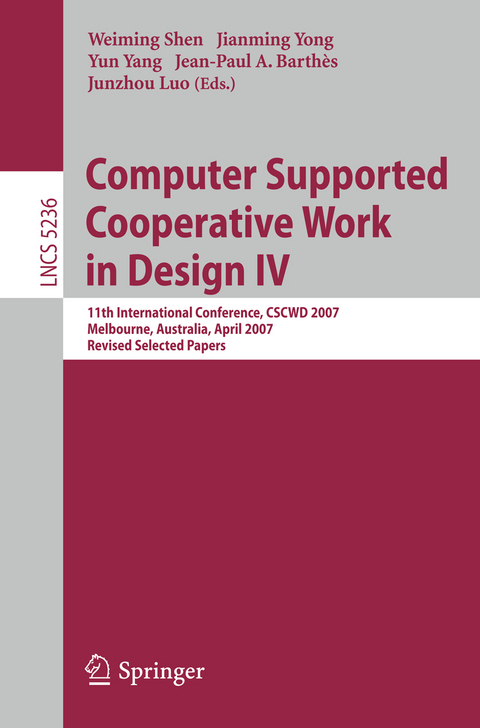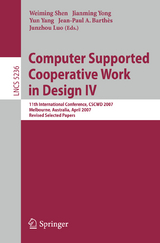Computer Supported Cooperative Work in Design IV
Springer Berlin (Verlag)
978-3-540-92718-1 (ISBN)
CSCW Techniques and Methods.- CSCW Design Team Selection and Issue Management.- Supporting the Development of Applications in Heterogeneous Ubiquitous Computing Environments.- Handling a Cooperative Design Context with an Interactive Graph Visualization.- Temporal Profiling for Opportunistic Partnership Recommendation.- Supporting Ubiquitous Collaboration with Real-Time Facial Animation.- Rejoining Collaborative Graphics Editing in Ubiquitous Environments.- Micro-estimation Based Global Collaborative Task Arrangement in Distributed Software Design.- Research and Development of a CMMI-Compliant Requirement Management System for Software Engineering.- CSCW from Coordination to Collaboration.- Cooperative Shot Boundary Detection for Video.- Collaborative Design.- Implementation and Experimentation of a Mixed Reality Collaborative Design Space.- To Implement Distributed Multidisciplinary Federated Simulation for Collaborative Product Development.- Research on Network-Based Collaborative Commodity Development.- Parametric Study Using an Integrated Design System to Assess Fatigue Durability of Control Arms in Automobile Suspension Module.- Towards High Coherent Requirement Implementation in Evolving Global Cooperative Software Design.- Collaborative Manufacturing and Enterprise Collaboration.- A Solution of Industrial Simulation Codes Sharing in Manufacturing Grid.- A Study on Evaluation System for Collaborative Information System in Manufacturing Industry.- Hybrid Heuristic for m-Machine No-Wait Flowshops to Minimize Total Completion Time.- Real-Time Conflict Detection in Cooperative Plant Design System Combining Prior and Context.- Heterogeneous Information Processing and Integration in Enterprise Management Information Systems.- A Study of Relationship between Customer andSupplier in Cutlery Outsourcing.- Agents and Multi-agent Systems.- An Adaptive Agent Negotiation Framework.- An Engineering Framework and Service Portal for the Integration of Cooperative Engineering Processes.- E-Business Process Modelling with Finite State Machine Based Service Agents.- A Framework to Collaborative and Incremental Development of Distributed Information Systems.- Organization Evaluation of Product Development Process Using Agent Based Simulation.- Research and Implementation of an Enterprise-Class MAS Application Development Framework-JadeEE.- An Agent-Based Intelligent Transport System.- Web Services, Semantic Web, and Grid Computing.- QoS Requirements for a Medical Application on the Grid.- Discovering the Most Suitable Web Service in Collaboration Environment.- Mapping Bitemporal XML Data Model to XML Document.- Enterprise Information Infrastructure: An Ideal Framework for Rapid Business System Development.- A Replica Replacement Algorithm Based on Value-Cost Prediction.- A Grid Information Services Architecture Based on Structured P2P Systems.- Large Scale Distributed Virtual Environments on the Grid: Design, Implementation, and a Case Study.- Knowledge Management.- A Methodology for Scientific Customer Relationship Management.- Design and Evaluation of Intelligent Menu Interface through Cognitive Walkthrough Procedure and Automated Logging for Management Information System.- Security, Privacy, Trust in CSCW Systems.- Cooperative Intrusion Detection Model Based on State Transition Analysis.- An Incentive-Based Secure Charging Scheme for Integrating Networks.- A Proposal for Recognizing Reputation within Communities of Practice.- A Framework for Reputation Management in Large-Scale Distributed Systems.- A Novel Automated Trust NegotiationFramework for Securing Grids.- Trust Management Model and Evaluation Method for Online Travel.- Workflow Management.- A Flexible Access Control Model for Dynamic Workflow Using Extended WAM and RBAC.- An Approach to Enable Workflow in Mobile Work Scenarios.- Research and Implementation on CSCW-Based Workflow Management System.- E-Learning.- A Platform Supporting the Implementation of Collaborative Learning through Participatory Simulations.- Enhancing the Privacy of e-Learning Systems with Alias and Anonymity.- Using Concept Maps Methodology to Design an e-Learning Platform via Integration of Knowledge Management, Instruction and Learning.- Development of an e-Learning Platform Based on the Problem-Based Learning.- Comparison Study on Sketching Behaviors with and without Interactive Pen Displays.- Other Applications.- Collaborative Medicine Systems - Modeling Concept and Architecture.- Design of a Measurement System of End-User Information Competency and Its Applications.- Online Task Scheduling for Heterogeneous Reconfigurable Systems.- Case Study on Optimization of Rectangular Object Layout by Genetic Algorithm.- Using Asset Teams to Design Mass-Customizable Next-to-Skin Apparel.- Design of a Competency-Based Instrument for Measuring End-User e-Business Capability.- A Neural Network-Based Approach to Identifying Out-of-Control Variables for Multivariate Control Charts.- Designing Rainwater Harvesting Systems for Large-Scale Potable Water Saving Using Spatial Information System.- Load Identification in Neural Networks for a Non-intrusive Monitoring of Industrial Electrical Loads.
| Erscheint lt. Verlag | 18.12.2008 |
|---|---|
| Reihe/Serie | Information Systems and Applications, incl. Internet/Web, and HCI | Lecture Notes in Computer Science |
| Zusatzinfo | XII, 676 p. |
| Verlagsort | Berlin |
| Sprache | englisch |
| Maße | 155 x 235 mm |
| Gewicht | 1044 g |
| Themenwelt | Mathematik / Informatik ► Informatik ► Betriebssysteme / Server |
| Informatik ► Software Entwicklung ► User Interfaces (HCI) | |
| Schlagworte | Access Control • augmented reality • business process management • Cellular network • collaborative computing • collaborative design environments • collaborative modeling and simulation • Computer Aided Design • Computer supported cooperative work • concept maps • Concurrency • cooperative engineering • cooperative systems design • Design • distributed interaction • Distributed Systems • E-Commerce • E-Learning • evolving software • Genetic Algorithm • grid computing • Hardcover, Softcover / Informatik, EDV/Betriebssysteme, Benutzeroberflächen • HC/Informatik, EDV/Betriebssysteme, Benutzeroberflächen • Human Computer Interaction • hybrid heuristics • knowledge management • MANETs • Middleware • Model Driven Engineering • Multi-agent Systems • neural network • Ontologies • Peer-to-Peer Network • privacy • Process Automation • QoS • security • semantic web services • Social Networks • Trust • ubiquitous environment • Usability • Virtual Reality • Web-Based Cooperation • Web Services • Workflow Management • XML Schema |
| ISBN-10 | 3-540-92718-2 / 3540927182 |
| ISBN-13 | 978-3-540-92718-1 / 9783540927181 |
| Zustand | Neuware |
| Haben Sie eine Frage zum Produkt? |
aus dem Bereich




